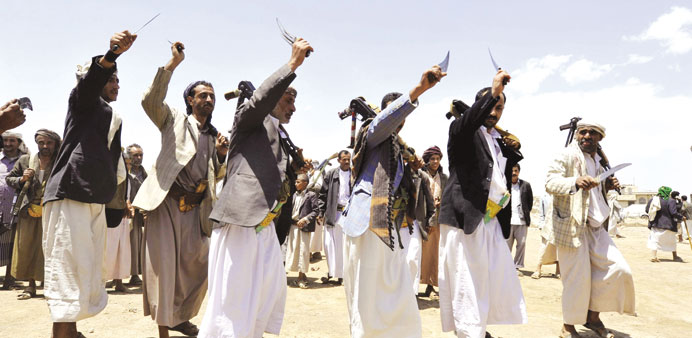Armed men loyal to the Houthi movement perform a traditional dance at an anti-government protest camp on the northern outskirts of Sanaa yesterday.
Yemen’s president dismissed his government yesterday, proposed a national unity administration and suggested reinstating fuel subsidies, government sources said, in moves to quell weeks of unrest by a rebel movement.
But the Houthis, a Shia Muslim group that had massed tens of thousands of supporters in the capital Sanaa with camps set up near the interior ministry, rejected the compromise proposals by President Abd-Rabbu Mansour Hadi.
The impasse raises fears of worsening instability in Yemen, which is also struggling with a stubborn Al Qaeda insurgency and southern secessionists.
The Houthis, who are demanding that the government resign and subsidies be fully restored, have been fighting for years for more power for their Zaidi sect in north Yemen.
Government sources said Hadi had dismissed his government, suggested a national unity administration and planned to reduce petrol and diesel prices by 30% to offset unpopular cuts to fuel subsidies, which had drained Yemeni coffers but buoyed impoverished citizens.
A government source said implementation of the initiative depended on the Houthis’ acceptance.
Mohamed Abdulsalam, a spokesman for Houthi leader Abdulmalek al-Houthi, said in a statement on his Facebook page: “We do not agree to it. Our position is still that we (stand) by the Yemeni people who have gone out in a blessed popular revolution to demand their legitimate and just rights.”
A member of the Houthis’ political bureau, Abdel Malik al-Ijri, said: “What was demanded was a cancellation of the fuel price rise, and the lowering which was announced today represents nothing.”
With the Houthis’ rejection, it is unclear what the government’s next move will be. However, Hadi, in a speech before the meeting where the proposal was signed, suggested his patience was running out.
“I affirm that I will deal decisively with all attempts to shake security and carry out division,” he said in remarks on the state Saba news agency.
Insecurity and political turmoil have mounted in Yemen since Arab Spring protests ousted veteran autocrat Ali Abdullah Saleh in 2011 and Hadi took his place in a complex deal mediated by the United Nations, Gulf neighbours and the United States.
The United States and Saudi Arabia were alarmed by the rapid growth of Al Qaeda in Yemen in the disorder created by the anti-Saleh uprising and are keen to avoid a spread into the majority Sunni Muslim state of sectarian bloodshed plaguing other regions of the Middle East.
In a copy of Hadi’s initiative seen by Reuters, the president plans a minimum wage rise and the allotment of ministerial posts to the Houthis and other constituencies while retaining the right to the weightiest portfolios of finance, foreign affairs, defence and the interior.

